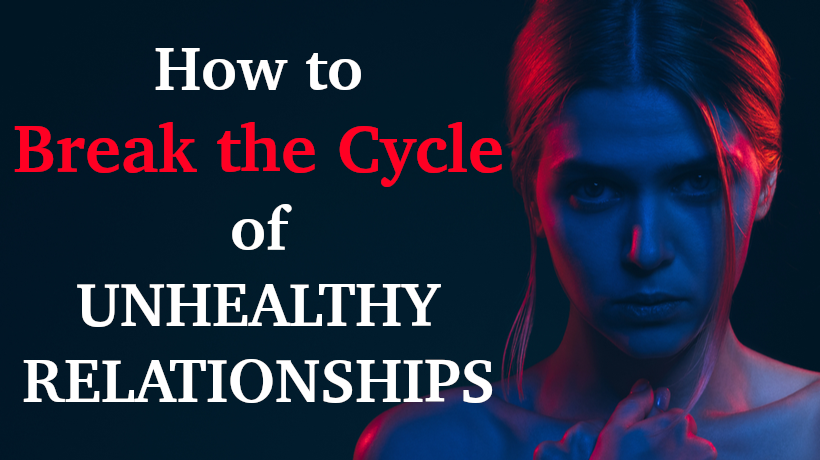You probably know that one person who gets out of one relationship and then immediately gets into another one. You don’t even remember the names of their partners anymore, because really, what’s the point?
Sometimes we get stuck in a cycle of unhealthy relationships, and it can be hard to break the cycle when it’s what we are used to. Below are six tips to help break the cycle of unhealthy relationships.
Be aware of toxic and harmful behavior.
Whether you are doing it yourself or your partner is doing it, the first thing we need to do is recognize these unhealthy behaviors. That way, we know what to look for and what to do when a certain type of destructive behavior rears its ugly head.
Sharon Martin, LCSW, says, “If you grew up in a dysfunctional family, you may not know what a healthy relationship looks like and feels like: You didn’t have good role models.” She then proceeds to list a few red flags that should alert you that your relationship is either 1) not worth it or 2) needs fixing.
Physical abuse: pushing, kicking, hitting, etc.
Emotional or mental abuse: name-calling, yelling, blaming, gaslighting, etc
Dishonesty: lying, cheating, stealing, telling stories that don’t add up
Jealousy: controlling who you get to see, where you go, what your curfew is, what you wear, or how much money you should have, reading your texts, accusing you of things you did not do, and hacking into your phone by knowing your passwords
Avoidance: unwilling to address critical problems that may help to heal the relationship, emotionally unavailable, retreating when they get uncomfortable
Codependency: clingy, no balance with emotional regularity, both parties should be emotionally mature (for their age) to make the relationship work.
Figure out why you’re in this cycle by looking at your past.
We have to understand why we love to be in unhealthy relationships. Sometimes, it may be because unhealthy relationships are all we know and it feels like love. The feeling of familiarity can really challenge the perception of deciding when to break the cycle.
Other times, Martin says “We also tend to repeat what we learned in childhood.” Children are like sponges — they soak up the knowledge that they see around them. If you saw your mother and father have a high conflict marriage, you might (unconsciously) see your parents’ marriage as idealistic.
Low self-esteem may also be a reason for your cycle of unhealthy relationships. Martin says, “you may repeat dysfunctional relationship patterns because you don’t feel worthy of being treated with respect and unconditional love.”
Martin notes that these ideas tend to stem from childhood. If you were emotionally and mentally abused as a child, you may have low self-esteem and seek out a partner who does not make you feel worthy. This helps to further your belief that “you are not good enough” due to the way your partner treats you.
Heal the trauma(s).
Partners are not supposed to heal us because we have the capacity to do that for ourselves. Martin states, “Until your emotional wounds and unmet needs are resolved, you will continue to seek healing from partners who are unable to give you the love, acceptance, and emotional safety that you need and deserve.”
Making an appointment to speak with a therapist may help you to break the cycle and heal the trauma(s).
Practice better relationship habits
To get different results, try new habits and behaviors that will help you in the long run.
Martin suggests improving communication skills, regulating emotions, and setting boundaries as great places to start.
“Self-help books can be a good place to begin, as well as psycho-educational groups and therapy,” she says.
Be happy and single.
The fear of being alone is known as autophobia. Face your fears and take some time for yourself. When was the last time you went out on a date by yourself? Or walked in a park in complete solitude just enjoying the sound of the rushing lake nearby?
“Sometimes, taking time between relationships allows you to prioritize yourself in new ways, learn skills, process your feelings, and gain new insights,” Martin says. “Choosing to be single or to have fewer friends doesn’t mean there’s something wrong with you. In fact, it can reflect healthy self-esteem and knowing that you deserve to be treated well.
Practice the golden rule: treat yourself the way you want to be treated
The well-known golden rule, “treat others how you want to be treated” can be twisted a bit for more self-reflection. Treat yourself the way you treat other people. More likely than not, most people treat others a lot better than they treat themselves. You wouldn’t call your friends bad names or tell them they’re stupid and unlovable because they’re single, so why do that to yourself?
“If we want others to treat us well, we have to treat ourselves well, too,” Martin says. “We have to value and accept ourselves, take good care of our bodies and emotions, trust ourselves, respect our opinions, and work toward our goals. When we do these things, others will follow.”



